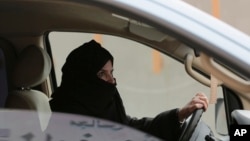Saudi Arabia is using its counterterrorism laws to silence activists, including women, in violation of international law guaranteeing freedom of speech, United Nations human rights experts said Monday.
The kingdom's public prosecutor has begun preparing the trials of detainees, identified by watchdog groups as women's rights activists, after completing its investigations, state news agency SPA said Friday.
A panel event entitled "Saudi Arabia — Time for Accountability" was held Monday on the sidelines of the U.N. Human Rights Council.
The Saudi counterterrorism law and other regulations are "unacceptably wide and unacceptably vague," said Fionnuala Ni Aolain, U.N. special rapporteur on protecting human rights while countering terrorism.
"It includes people who are engaged in promoting or inciting sit-ins, protests, meetings or group statements. Anyone who harms the unity or stability of the kingdom by any means. These are notoriously slippery terms," she said.
"These laws are used to directly attack and limit the rights of prominent human rights defenders, religious figures, writers, journalists, academics, civil activists and all of these groups have been targeted by this law," Ni Aolain said.
Michel Forst, U.N. special rapporteur on the situation of human rights defenders, said he has been in touch with the Riyadh government for the past year since its "crackdown."
"Worrisome for me is the targeting of women human rights defenders," he said.
These concerned not just women involved in the right to drive movement, "but also all kinds of women," Forst said, adding: "All arrests involved incommunicado detention at undisclosed locations."
Abdulaziz M.O. Alwasil, Saudi ambassador to the U.N. in Geneva, told the Human Rights Council last Friday: "The kingdom heeds in its measures all international and national standards related to human rights."
Terror suspects
Its counterterrorism measures are based not only on security measures, but take into account legal and other necessary aspects to deal with terror suspects, he said.
At Monday's panel, Saudi and other campaigners called on the kingdom to release defenders whom they said were unjustly held, naming rights lawyer Walid abu al-Kahir, poet Ashraf Fayadh and women including Loujain al-Hathloul and Israa al-Ghomgham.
"Some are leaders of famous campaigns like the right to drive and abolishing male guardianship. These attacks are designed to mute their voices and dismantle the movements in the country," said Zaynab al-Khawaja of the Gulf Center for Human Rights.
Facing torture
Issuing her group's report on alleged torture in Saudi Arabia, she said: "We highlight some of the torture methods that are being used in Saudi Arabia — electrocution, flogging, sometimes whipping, on the thighs for example, sexual assault where some women human rights defenders have been stripped, have been groped, have been photographed naked, some while handcuffed, and others while blindfolded."
Omaima al-Najjar, a Saudi blogger living in exile since fleeing the kingdom, voiced concern for at least 18 women she said had been charged.
"It is important to remember that while so many women for example now can drive, women who campaigned for driving are still in prison. While so many women can finally vote, or women can finally go to the cinemas, a lot of the activists who called for those reforms are still in prison," she told Reuters. "I'm concerned that those women, if there is no international pressure, will end up spending the rest of their lives in prison, if not executed."





